Mental Health Support Needs Assessment for RCC Patients
Please answer the following questions to assess your current mental health status. These are based on standard screening tools used in clinical practice.
Complete the screening above to see personalized recommendations for mental health support tailored to your needs.
Facing a diagnosis of Renal Cell Carcinoma (RCC), a type of kidney cancer that accounts for about 90% of malignant kidney tumours is overwhelming enough, but the emotional fallout can be just as debilitating. That’s why mental health support isn’t a nice‑to‑have extra-it’s a core component of effective cancer care.
What Makes Mental Health Support Essential for RCC?
When oncologists talk about tumour staging, treatment options and survival rates, the conversation often skips how patients cope day‑to‑day. Yet research from the British Association of Cancer Research (2023) shows that RCC patients who receive structured psychosocial care report a 30% higher quality‑of‑life score and are twice as likely to adhere to their medication schedule.
Three key reasons drive this link:
- Stress hormones can affect tumour biology. Chronic cortisol spikes may blunt immune response, potentially influencing disease progression.
- Emotional distress leads to poorer self‑care. Skipping appointments, neglecting nutrition, or missing dialysis (for those with compromised kidneys) becomes more common.
- Family dynamics shift. Without proper support, caregivers can burn out, which in turn reduces the patient’s support network.
Common Psychological Challenges in RCC
Understanding the usual emotional reactions helps you spot when professional help is needed.
- Depression affects roughly 25% of RCC patients within the first year of diagnosis. Symptoms include persistent sadness, loss of interest, and fatigue.
- Anxiety is reported by up to 40% of patients, often centred on fear of recurrence. Physical signs can be rapid heartbeat, sweating, or insomnia.
- Feelings of isolation. Even in a bustling hospital, the rarity of RCC (about 2% of all adult cancers) can leave patients feeling "the odd one out".
- Body‑image concerns after surgery or targeted therapy, especially when scars or side‑effects become visible.
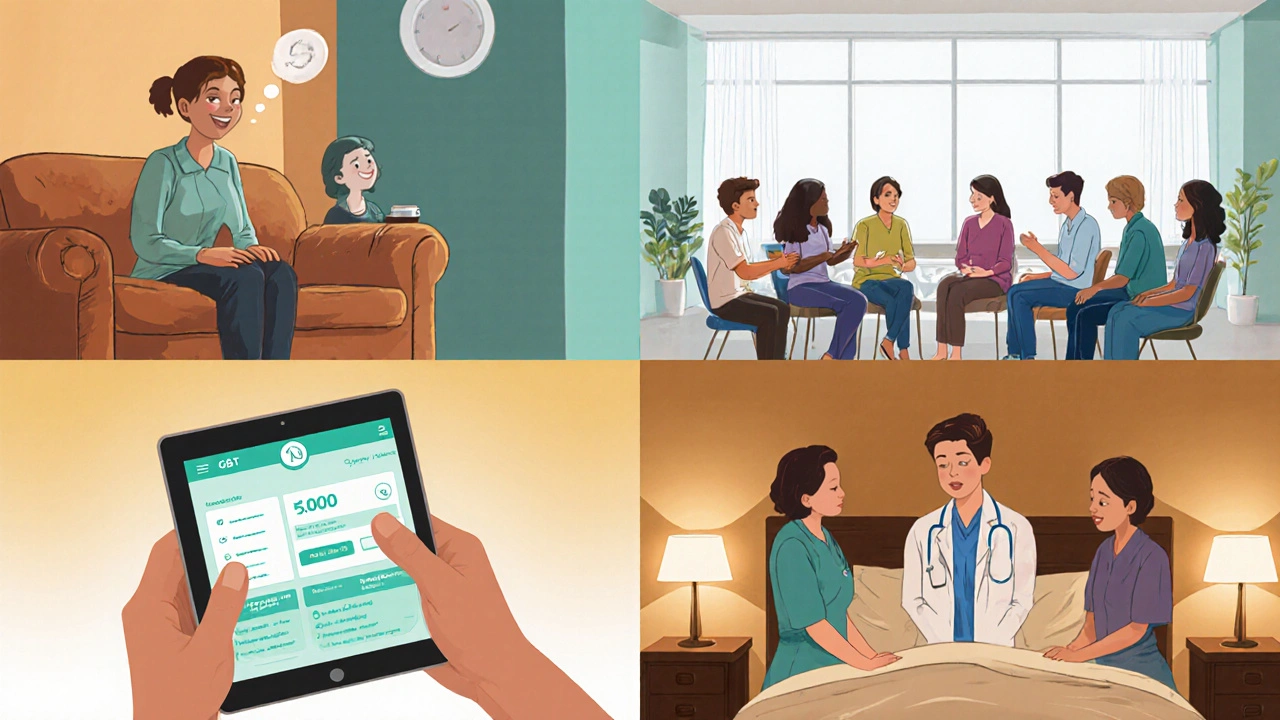
Types of Mental Health Support Available
Not every patient needs the same level of care. Below is a quick comparison of the most common options.
| Support Type | Format | Typical Frequency | Estimated Cost (UK) | Best For |
|---|---|---|---|---|
| Psychotherapy Individual or couples sessions with a licensed therapist | One‑to‑one talk | Weekly or bi‑weekly | £70-£120 per session (NHS referral may reduce cost) | Moderate‑to‑severe depression or anxiety |
| Support Group Peer‑led meetings, often hospital‑based | Group setting (in‑person or virtual) | Monthly | Free to £20 per meeting | Feeling isolated, need shared experiences |
| Online Platforms Apps or web portals offering CBT modules, meditation, forums | Digital self‑help | Self‑paced | Free to £15/month | Tech‑savvy patients, limited mobility |
| Palliative Care Holistic team covering pain, spiritual, and emotional needs | Multidisciplinary visits | Weekly or as needed | Covered by NHS for advanced disease | End‑stage disease, complex symptom burden |
Integrating Mental Health Support Into Oncology Care
Leading cancer centres in the UK now embed a mental‑health clinician within the Oncology team that oversees diagnosis, chemotherapy, and follow‑up. Here’s a typical workflow:
- At diagnosis, the oncologist triggers a psychosocial screen (PHQ‑9 for depression, GAD‑7 for anxiety).
- If scores exceed threshold, a referral is sent to the hospital’s mental‑health liaison.
- The liaison schedules an initial assessment within two weeks, offering choices (psychotherapy, group, or digital platform).
- Progress is reviewed at each oncology visit, allowing rapid adjustments.
For patients treated in community hospitals, the same process can be replicated via tele‑health links with larger cancer centres.
Practical Steps for Patients and Caregivers
Even if you’re not at a big centre, you can take concrete actions:
- Ask for a psychosocial assessment. Mention the word "mental health" during your next appointment.
- Keep a symptom diary. Note mood swings, sleep quality, and any panic attacks. This data speeds up referrals.
- Explore NHS‑approved resources like the Cancer Support Helpline (08088008000) or the Macmillan Cancer Support website.
- Consider a local Support Group-many NHS trusts host monthly meetings.
- If cost is a barrier, ask your GP about the Mental Health Act‑qualifying criteria for free therapy.
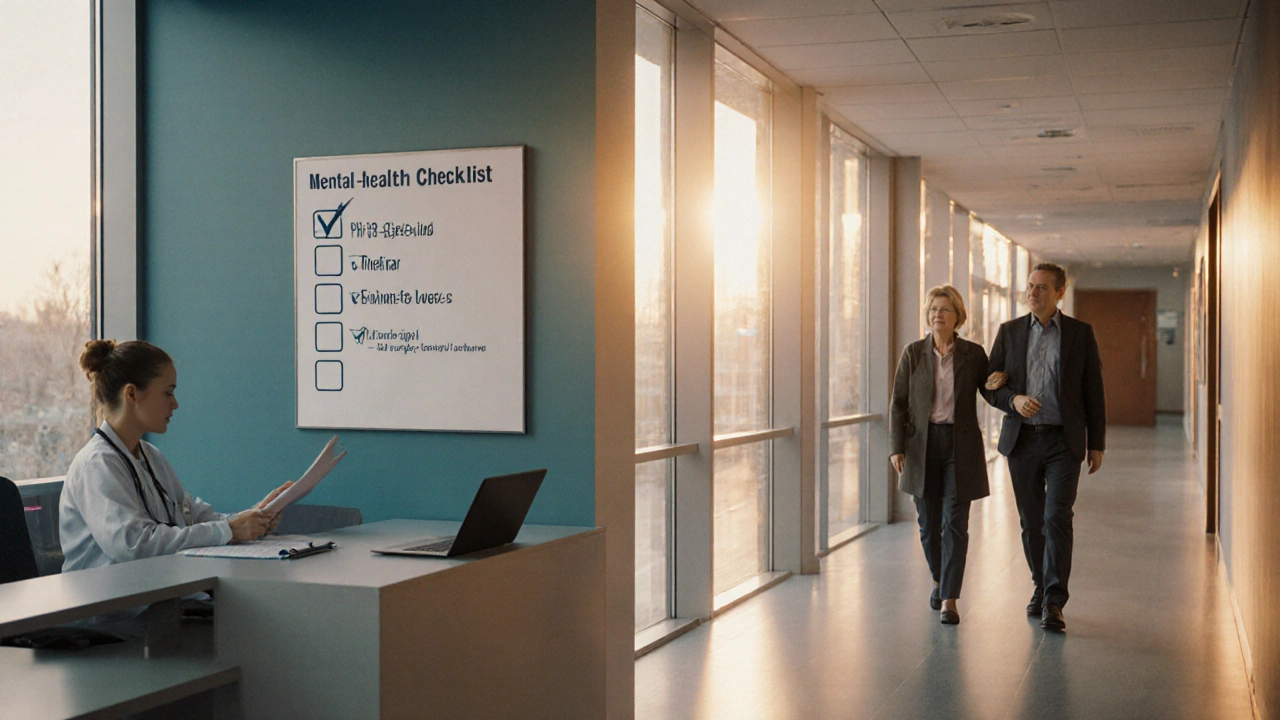
Checklist: Ensuring You’re Covered
- ✅ Completed PHQ‑9 and GAD‑7 screening?
- ✅ Referral to a mental‑health professional within 2 weeks?
- ✅ Enrolled in at least one support avenue (therapy, group, or app)?
- ✅ Family or caregiver has access to education resources?
- ✅ Follow‑up plan documented in your oncology notes?
Real‑World Stories
Emma, a 58‑year‑old from Bristol, shared how joining a local RCC support group cut her anxiety scores by 12 points in three months. She also started a low‑cost CBT app recommended by her nurse, which helped her manage medication‑related insomnia.
Meanwhile, James, a 45‑year‑old engineer, found that weekly sessions with a hospital psychologist allowed him to stay on target with his targeted therapy schedule, reducing missed doses from 20% to under 5%.
Frequently Asked Questions
Can I get mental health support if I’m on a private treatment plan?
Yes. Private oncology clinics usually employ or contract mental‑health specialists. You can also claim NHS mental‑health services if your GP refers you, even while receiving private cancer treatment.
What if I live far from a major cancer centre?
Tele‑health psychotherapy and online support groups have proven effective. The UK’s NHS LDP (Local Delivery Plan) funds virtual mental‑health appointments for rural patients.
Is there a risk that focusing on mental health will distract from my cancer treatment?
On the contrary, evidence shows that patients who receive psychosocial care are more likely to follow treatment schedules, experience fewer side‑effects, and enjoy longer survival.
How do I know which support type suits me?
Start with a brief screening (PHQ‑9/GAD‑7). Scores under 5 suggest mild distress-online CBT or a support group may suffice. Scores 10 or higher usually warrant professional psychotherapy or a combined approach.
Are my mental‑health records kept confidential?
Yes. In the UK, mental‑health notes are protected under the Data Protection Act 2018 and GDPR. They are only shared with your explicit consent or when clinically necessary.
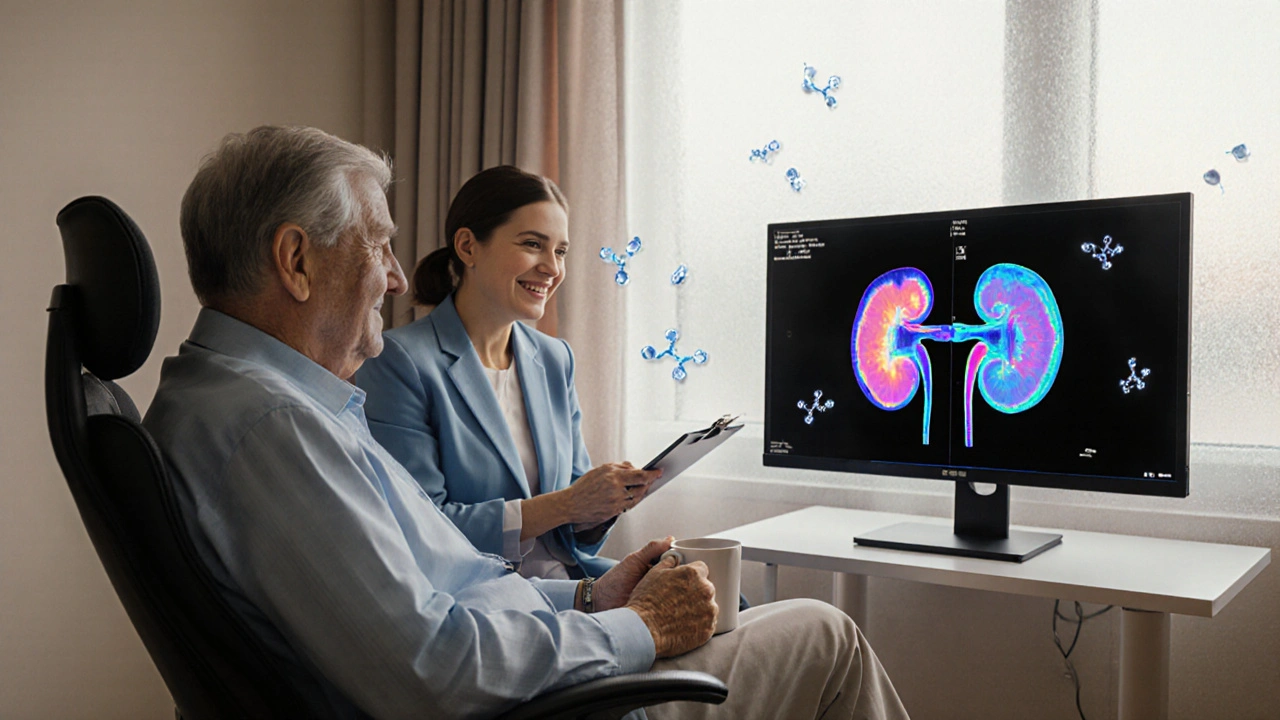

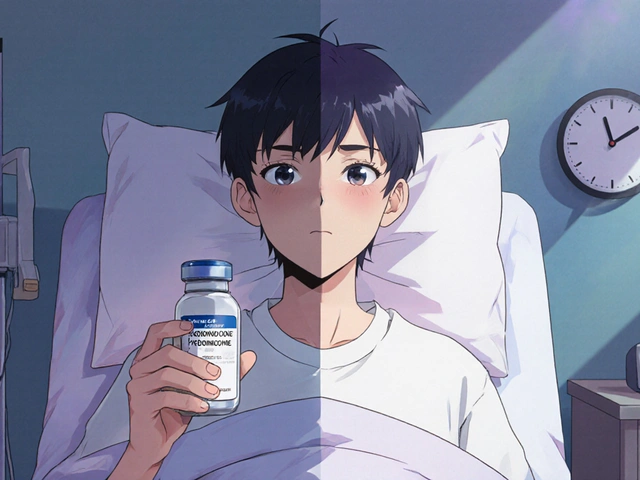
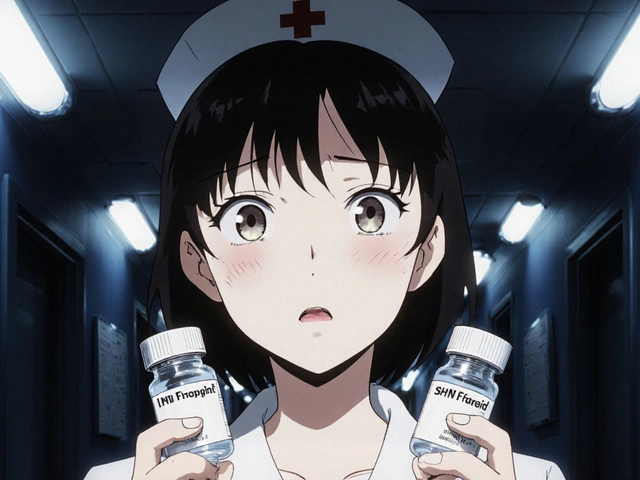
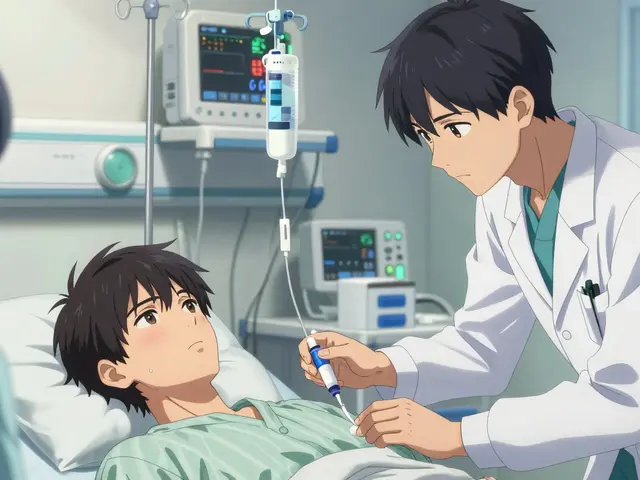
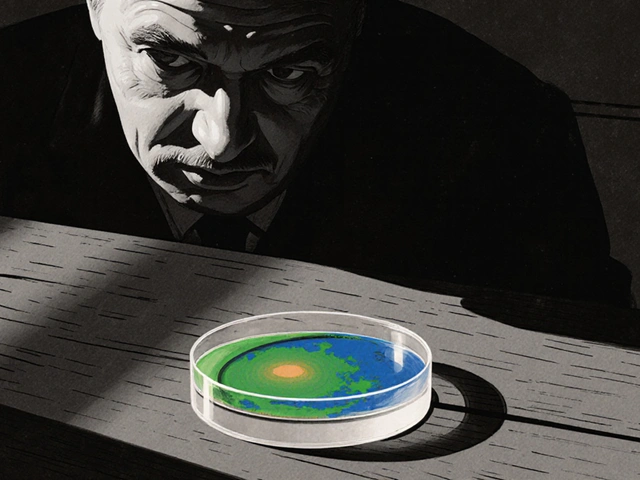


Posts Comments
Patrick Renneker October 8, 2025 AT 12:05
While many extol the virtues of clinical treatment, one must not overlook the profound influence of mental well‑being on oncological outcomes.
In the specific context of renal cell carcinoma, the psychological burden frequently rivals the physiological challenges.
Empirical evidence demonstrates that patients who receive structured emotional support exhibit superior adherence to therapeutic regimens.
Moreover, the neuroendocrine pathways linking stress to tumor microenvironment modulation are increasingly elucidated.
Consequently, neglecting mental health constitutes a form of therapeutic nihilism that is both unethical and empirically indefensible.
One might argue that resources should prioritize pharmacologic innovation; however, such a stance ignores the integrative nature of patient care.
The psychosocial dimension encompasses anxiety, depression, and existential distress, each capable of diminishing quality of life.
Addressing these facets through counseling, peer groups, and mindfulness interventions can mitigate somatic symptom amplification.
Clinical guidelines now recommend routine screening for depression and anxiety in oncologic populations, a policy that warrants strict implementation.
The utility of validated instruments, such as the PHQ‑9 and GAD‑7, lies not merely in diagnosis but in guiding timely referrals.
Furthermore, interdisciplinary collaboration between oncologists, psychiatrists, and social workers fosters a cohesive support network.
Insurance frameworks, unfortunately, often lag behind, creating barriers to comprehensive mental health services.
Advocacy at both institutional and legislative levels is essential to rectify these inequities.
In sum, integrating mental health support into standard RCC care is a matter of scientific prudence and compassionate responsibility.
Failure to do so risks compromising not only survival statistics but also the very humanity of the therapeutic endeavor.
KAYLEE MCDONALD October 12, 2025 AT 13:19
I understand how overwhelming this can feel, and you deserve every bit of support.
Alec McCoy October 16, 2025 AT 14:32
Hey, you’re definitely not alone in navigating the emotional roller‑coaster that comes with a cancer diagnosis.
It’s crucial to build a community around you-whether that’s a support group, a trusted friend, or a therapist-because sharing the load lightens it for everyone.
Remember, resilience isn’t about never feeling down; it’s about finding the tools and people that help you bounce back each time.
So keep asking for help, stay proactive with coping strategies, and celebrate the small victories along the way.
Aaron Perez October 20, 2025 AT 15:45
One could posit, with a modicum of philosophical rigor, that the mind, in its ceaseless quest for meaning, becomes both a sanctuary and a battleground, a paradoxical theater where hope and dread perform in tandem;
yet, the modern medical paradigm, in its oft‑myopic focus, tends to compartmentalize psyche from soma, thereby ignoring the dialectic interplay that shapes patient outcomes;
consequently, we must interrogate not merely the biochemical cascades of renal cell carcinoma, but also the ontological narratives we, as sufferers, construct around mortality;
indeed, the very act of acknowledging emotional distress constitutes a subversive rebellion against the hegemonic silence imposed by clinical conventions.
William Mack October 24, 2025 AT 16:59
Curious how many clinics actually offer on‑site counseling for RCC patients?
Evan Riley October 28, 2025 AT 17:12
They don’t tell you that most of the pharma giants are in cahoots with the insurance companies to keep mental health services expensive, ensuring they profit while patients suffer in silence.
Nicole Povelikin November 1, 2025 AT 18:25
i think its overblown theres no need for all these extra sessions especially when u could just toughen up and ignore teh feelings.
Michelle Weaver November 5, 2025 AT 19:39
Happy to share that many hospitals now have dedicated psycho‑oncology teams; they’re great at integrating therapy with treatment plans 🌟. If you haven’t tried it, ask your oncologist about a referral – the support can make a huge difference 😊.
John Keough November 9, 2025 AT 20:52
That’s a solid suggestion – bridging the gap between physical and mental care really does create a more holistic healing environment. Let’s keep encouraging the dialogue and sharing resources.
Graham Smith November 13, 2025 AT 22:05
While the content is helpful, I’ve noticed a few typographical errors that could be cleaned up for clarity.
Jeremiah Morgan November 17, 2025 AT 23:19
Indeed, maintaining a positive outlook paired with professional support can markedly improve both mood and treatment adherence, fostering a resilient spirit throughout the journey.
nina greer November 22, 2025 AT 00:32
Such discussions belong in elite academic circles, not on public forums.
Montague Tilmen November 26, 2025 AT 01:45
We shouldn’t let foreign influences dictate our healthcare policies; our nation's patients deserve the best, no compromises.
Write a comment